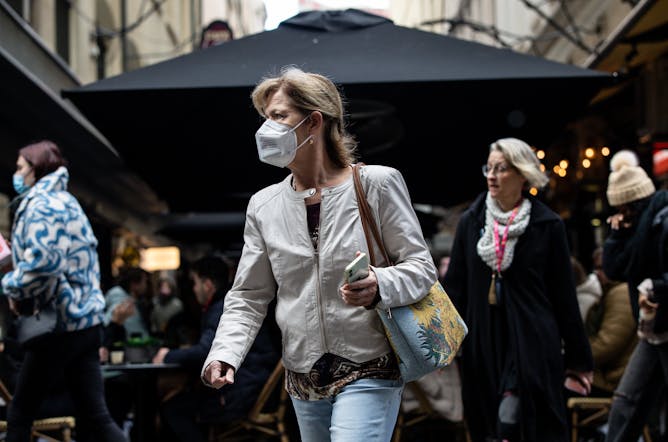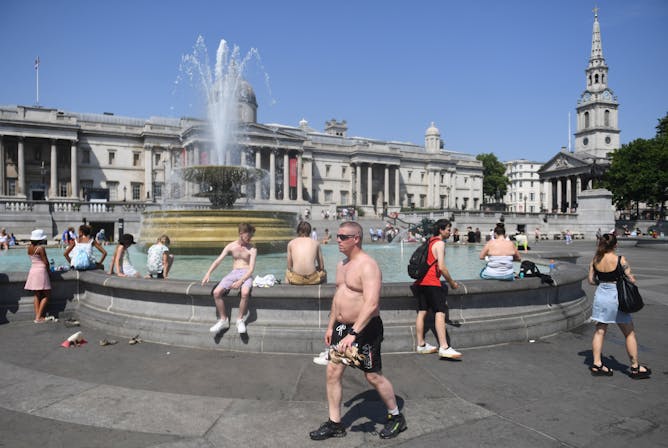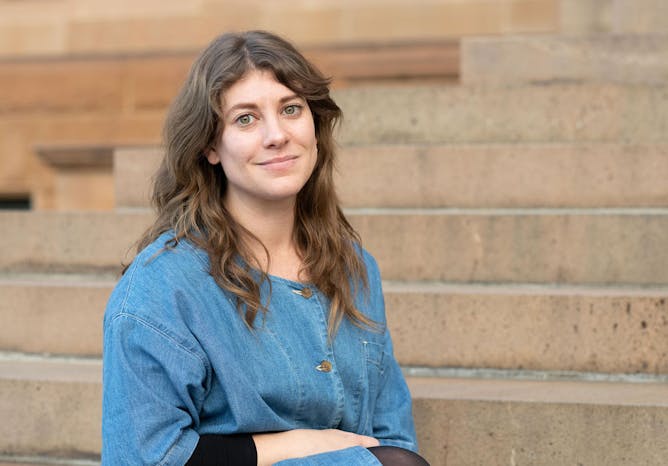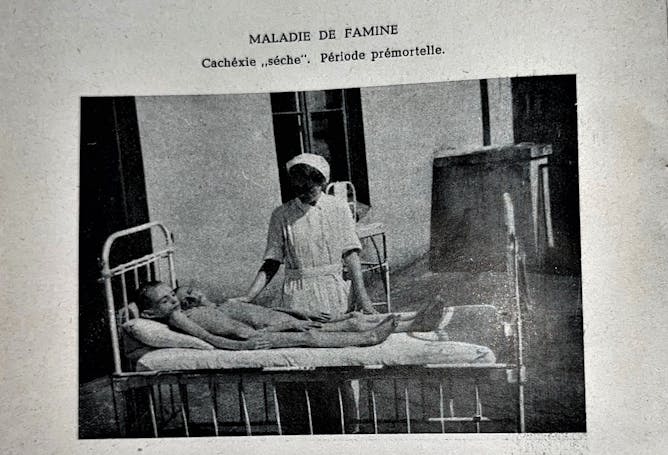|
Official COVID case numbers are climbing – and the real numbers are likely several times higher. But it seems like the majority of people have not gone back to mask wearing indoors just yet. State and federal governments have stopped short of reinstating mask mandates – despite calls from health experts – though they remain active in settings like public transport and health facilities. Leaders are however “strongly suggesting” it’s time to cover our faces again.
As Griffith University expert Thea van de Mortel notes, being in a space where people are talking loudly, laughing, singing or shouting is more risky for COVID. Being in a crowded place for an extended period is risky too.
The best research available shows wearing no mask or an old cloth one doesn’t offer much protection. Instead, respirators (fitted snugly to cover the nose and mouth) are rated to block 95% of particles in the air.
It’s annoying and a little triggering. But the time has come again to get boosted, stay home if we’re sick, socially distance and wear a respirator when we can’t.
|

|
Lucy Beaumont
Health + Disability Editor
|
|

Thea van de Mortel, Griffith University
They’ve stopped short of mandates, but authorities and experts are strongly suggesting it’s time to cover our mouths and noses again to prevent COVID infection. This time, reach for a respirator.
|

Andrew King, The University of Melbourne
Summer heat may be far from people’s minds here in Australia. But Europe’s ordeal is yet another sign changes in Earth’s climate have already reached dangerous levels.
|

Jen Webb, University of Canberra
Bodies of Light is brutally precise in its portrayal of the enduring consequences of a traumatic childhood.
|

Michelle Grattan, University of Canberra
We talk a lot about corrupt behaviour in politics and holding wrong-doers to account. But there’s another problem: the need for politicians to have better values and standards in the first place.
|

Merry Fitzpatrick, Tufts University; Irwin Rosenberg, Tufts University
The story behind the research can be as compelling as the results. Recording the effects of starvation, a group of Jewish doctors demonstrated their dedication to science – and their own humanity.
|

Anthony Hannan, Florey Institute of Neuroscience and Mental Health
The key to understanding how brains can recover from trauma is that they are fantastically plastic – meaning our body’s supercomputer can reshape and remodel itself.
|

Kylie Soanes, The University of Melbourne
Having so many threatened species live among us in our towns and cities reflects the impacts of urban development but is also an opportunity for us all to pitch in and ensure their survival.
|

Ausma Bernot, Griffith University
It’s pretty common to find people who are apathetic about their data being harvested and funnelled into unknown corners. But that’s usually because they don’t know what’s at stake.
|

Benjamin T. Jones, CQUniversity Australia
Tariq Ali’s scathing new book assessing Winston Churchill’s life and legacy paints him as a racist opportunist but overstates Churchill’s enduring influence on politics today.
|

Joanna Moncrieff, UCL; Mark Horowitz, UCL
A new shows there’s no clear evidence that depression is caused by abnormally low levels of serotonin in the brain.
|
Politics + Society
|
-
Brendan Walker-Munro, The University of Queensland
Australians – and Australian governments – need to get more savvy about data privacy
-
John Hawkins, University of Canberra; Stephen Wilks, Australian National University
Given the Labor government’s small majority, the speaker’s role will be especially important in this parliament. The much larger cross-bench will be arguing for a greater voice.
-
Jill Sheppard, Australian National University; Jana von Stein, Australian National University
Our study found that overall, most people just aren’t motivated to take political action against Australia’s refugee policies – even if they strongly dislike them.
|
|
Health + Medicine
|
-
Dougal Sutherland, Te Herenga Waka — Victoria University of Wellington
Many workplaces focus on interventions to increase employees’ coping capacity, but they should be more proactive about creating better conditions at work and considering people’s home situations.
|
|
Science + Technology
|
-
Joanne Gray, University of Sydney; Cheryl Foong, Curtin University
After 20 years of copyright battles, publishers have still not found a way to make the most of the potential of digital books.
|
|
Environment + Energy
|
-
Liz Hanna, Australian National University; Mark Howden, Australian National University
We can no longer pretend we’re separate to nature. If ecosystems collapse, our society will be threatened too.
|
|
Education
|
-
Christina Ho, University of Technology Sydney
The NSW state government has just announced a major overhaul of its selective school program. This aim is to make it fairer for children from disadvantaged backgrounds to secure a coveted spot.
|
|
Arts + Culture
|
-
Chris Thompson, Australian Catholic University
Finucane & Smith inject burlesque and vaudeville with witty and often confrontational political provocations.
|
|
Business + Economy
|
-
Stephen Bartos, University of Canberra
The legislation doesn’t allow the Parliamentary Budget Office to obtain information from parties until the day before the poll.
-
Renee Barnes, University of the Sunshine Coast
We all love random act of kindness. But before you ‘like’ or share that heartwarming video, ask yourself if it’s an authentic feel-good moment or an act of exploitation.
|
|
| |
|
|
|
Cranlana Centre for Ethical Leadership at Monash University
Melbourne VIC, Australia
•
Full Time
|

|
|
|
|
| |
| |

|
| |
| |
| |
Featured Events, Courses & Podcasts
|
View all
|
|
|
|
| |
| |
| |
| |
| |
|
|